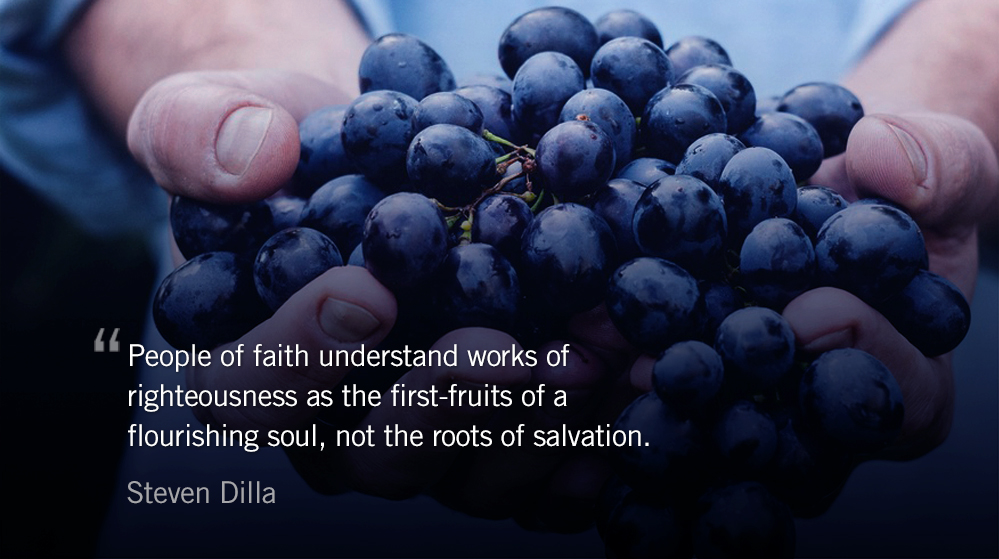“If you have not the blood of Christ at the root of your religion, it will wither, and prove but painted pageantry to go to hell in,” proclaimed the Puritan Thomas Wilcox in his sermon, Honey from the Rock.
The life of faith—living by and for the grace, power, and glory of God—is regularly contrasted in Christian writings against the life that revolves around self. Yet, it is possible to use the language of faith without transferring the seat of control and benefit to God and his Kingdom.
“Self-righteousness and self-sufficiency are the darlings of sinful human nature, which she preserves as her life,” observed Wilcox before going on to expound on the way we can highlight good works to conceal the darkness of our sin:
Consider, the greatest sins may be hid under the greatest duties, and the greatest terrors. See that the wound that sin has made in your soul be perfectly cured by the blood of Christ! not skinned over with duties, humblings and enlargements.
Apply what you will besides the blood of Christ, it will poison the sore. You will find that sin was never mortified truly, if you have not seen Christ bleeding for you upon the cross. Nothing can kill it, but beholding Christ’s righteousness.
“Comfort from any hand but Christ is deadly,” Wilcox explained. “All temptations, Satan’s advantages, and our complaining, are laid in self-righteousness, and self-excellency… You may destroy Christ by duties, as well as by sins.” Reading his sermon invokes the tension Martin Luther explored so deeply in his commentary on Galatians:
If the truth of being justified by Christ alone (not by our works) is lost, then all Christian truths are lost. For there is no middle ground between Christian righteousness and works-righteousness. There is no other alternative to Christian righteousness but works-righteousness; if you do not build your confidence on the work of Christ you must build your confidence on your own work. On this truth and only on this truth the church is built and has its being.
Wilcox and Luther’s insight, like the words from John Wesley that we read yesterday, do a wonderful job of contrasting the difference between self-righteousness and true faith. For a look at how to cultivate buoyant, resurrected, and winsome faith—without the weight of the contrast—we have to turn back to Wesley: “True religion, or a heart right toward God and man, implies happiness as well as holiness.”
Wesley believed that the apostle Paul, “sums up true religion in three particulars: righteousness, peace, and joy in the Holy Ghost.” He explained:
First, righteousness. The most important commandment is, “You shall love the Lord your God with all your heart and with all your soul and with all your mind and with all your strength.” You shall delight yourself in the Lord your God; you shall seek and find all happiness in him.
The Second great branch of Christian righteousness is closely and inseparably connected; “You shall love your neighbor as yourself.” You shall love—you shall embrace with the most tender good-will, the most earnest and cordial affection, the most inflamed desires of preventing or removing all evil, and of procuring for him every possible good—your neighbor.
You shall love every human creature, every soul which God has made, as yourself; with the same invariable thirst after his happiness in every kind, the same unwearied care to screen him from whatever might grieve or hurt either his soul or body.
With this peace of God, wherever it is fixed in the soul, there is also “joy in the Holy Ghost;” joy cultivated in the heart by the Holy Ghost, by the ever-blessed Spirit of God.
He it is that works in us that calm, humble rejoicing in God, through Christ Jesus, “by whom we have now received the atonement,” the reconciliation with God; and that enables us boldly to confirm the truth of the royal Psalmists declaration, Blessed is the man (or rather, happy) whose unrighteousness is forgiven, and whose sin is covered.
The tension couldn’t be more obvious—true religion is not found in the works of men, but you cannot have a life of faith without works. People of faith understand works of righteousness as the first-fruits of a flourishing soul, not the roots of salvation. True religion takes enormous devotion and discipline—but it is not dependent on them. It takes sacrifice and community—but it is not accelerated by our abilities to ‘deliver’ in either of these areas. We need honey from the rock—the nourishment of transcendent peace, accessible only by God’s grace, power, and glory—as Wilcox preached:
This will be sound religion: To rest all upon the everlasting mountains of God’s love and grace in Christ, to live continually in the sight of Christ’s infinite righteousness and merits—these things are sanctifying.
Today’s Reading
Nehemiah 12 (Listen – 6:30)
Acts 22 (Listen – 4:26)
This Weekend’s Readings
Nehemiah 13 (Listen – 5:57) Acts 23 (Listen – 5:15)
Esther 1 (Listen – 4:14) Acts 24 (Listen – 4:11)
The Weekend Reading List






